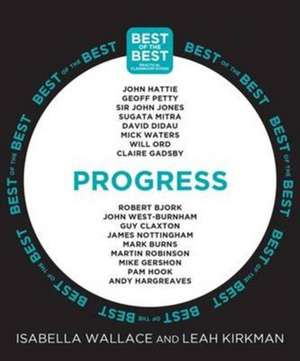Best of the Best: Best of the Best
Autor Isabella Wallaceen Limba Engleză Paperback – 23 mai 2017
Professor John Hattie makes a powerful argument, supported by practical examples, of how funding can be used effectively and equitably to enhance progress in learning for every pupil.
Geoff Petty points us to the invaluable resources provided by meta-research, which identify for us which are the most effective, progress-yielding teaching methods.
Sir John Jones, writing about life chances, reminds us of the enormous influence that the quality of teaching can have on pupil motivation and progress.
Sugata Mitra looks at the link between progress and improvement of life chances, and the role that technology can play in this respect.
David Didau echoes the postmodernists in his argument that progress in the classroom should not be thought of as linear, as a steadily advancing route of improvement aimed at some distant goal of perfection.
Professor Mick Waters refers to the practice of assessing progress against externally fixed markers as an 'obsession' which should be challenged.
Will Ord urges us to interrogate exactly what it is that we mean by 'progress'.
Claire Gadsby suggests that progress should be learner centred rather than criterion based and that it is only the pupil, not the teacher, who can demonstrate progress.
Professor Robert Bjork warns us against making a supposition not only about what pupils can do but also about what they may need from us in order to do it.
Professor John West-Burnham suggests that practice is essential to effective progress in learning, and that the effort we demand of our learners can be directly proportionate to the success they achieve in reaching their goals.
Professor Guy Claxton cautions that there is a fine line between challenging learners into making positive progress and 'over-stretching' them.
James Nottingham makes the point that the measurement of progress should not be made by teachers against externally set markers, but by learners against their own personal best.
Mark Burns argues that progress is a personal measure, not a fixed absolute.
Martin Robinson questions what he refers to as 'the progress myth'.
Mike Gershon urges the wider use by teachers of exemplar materials - examples of work which illustrate the content and standard which the pupils should be aspiring to as a next step in their learning.
Pam Hook suggests that progress is most usefully expressed not as a forward-moving line but as a spiral where learning experiences are returned to and repeated, perhaps several times, at increasingly higher levels or at greater depth.
Andy Hargreaves sees building confidence and self-belief as central to the teacher's role and not simply as an optional 'soft skill', and extends this same concept to the need for
Preț: 65.11 lei
Nou
Puncte Express: 98
Preț estimativ în valută:
12.46€ • 12.85$ • 10.40£
12.46€ • 12.85$ • 10.40£
Carte indisponibilă temporar
Doresc să fiu notificat când acest titlu va fi disponibil:
Se trimite...
Preluare comenzi: 021 569.72.76
Specificații
ISBN-13: 9781785831607
ISBN-10: 1785831607
Pagini: 176
Dimensiuni: 126 x 150 x 15 mm
Greutate: 0.18 kg
Editura: Crown House Publishing
Seria Best of the Best
ISBN-10: 1785831607
Pagini: 176
Dimensiuni: 126 x 150 x 15 mm
Greutate: 0.18 kg
Editura: Crown House Publishing
Seria Best of the Best
Notă biografică
Isabella Wallace is co-author of the bestselling teaching guides Pimp Your Lesson! and Talk-Less Teaching, and has worked for many years as an AST, curriculum coordinator and governor. She is a consultant for and contributor to the Oxford Dictionary of Education and presents nationally and internationally on outstanding learning and teaching.
